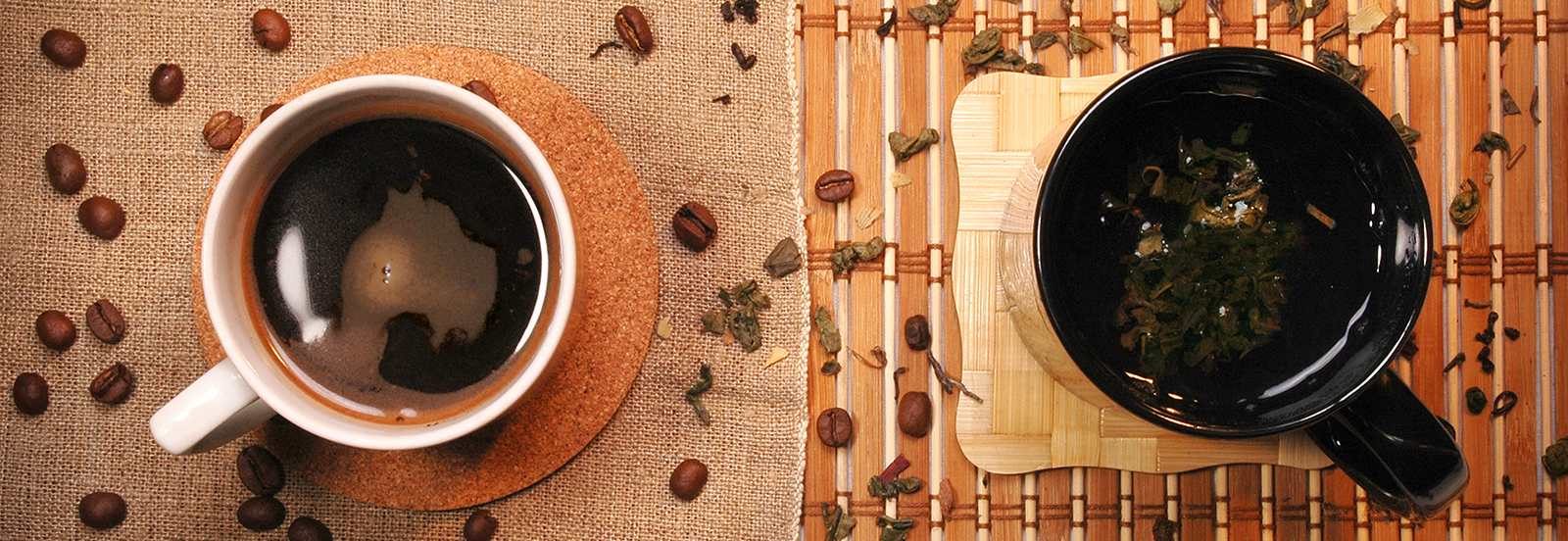People often consume beverages with breakfast. It is a good idea, as humans we do wake up dehydrated. In addition to the hydration, a boost to your senses is welcome. Many people love caffeinated beverages first thing in the morning to get themselves moving. While coffee has long been the U.S. choice for the morning wake up drink, there is currently a resurgence of tea as a starter, and with good reason.
We've been asked many times before, does black tea have caffeine? And if so, what is the caffeine content in coffee versus black tea?
How much caffeine is in coffee?
Depending on where you look - the number could be between 90-110 milligrams of caffeine in a cup of coffee. Of course, this can vary by the type of coffee beans used, quantity of beans used, the serving size, and to a lesser extent, the type of roast. This number is for a typical 8oz cup of coffee.

How much caffeine is in a typical 8 oz cup of black tea?
On average, you are looking at a number of around 45mg of caffeine per 8oz cup of black tea. Just like coffee, not all black tea is the same and the type of black tea can cause the overall caffeine content to vary. The type and grade of black tea leaf can result in different levels of caffeine. So these numbers are subject to some level of variation depending on where you look.
Is caffeine the answer?
One major theme to emerge in the past few years are energy drinks and superpowered coffee drinks that offer huge amounts of caffeine. One would think with simple math, using the sledgehammer approach to getting caffeine will deliver results quickly and give you the energy & alertness you need. But this is wrong for two reasons and why you shouldn't just judge solely on the caffeine in coffee versus black tea.
Too much caffeine can be bad for you
The old advice, everything in moderation includes caffeine intake. The mayo clinic recommends the average person consume no more than 400 mg of caffeine per day. What are potential side effects of too much caffeine consumption?
- Headache
- Insomnia
- Nervousness
- Irritability
- Frequent urination or inability to control urination
- Fast heartbeat
- Muscle tremors
Let's face it, most people don't drink 8 ounces of coffee - it's more like 12-16oz at a time. Assuming the 16 oz size, that's two large coffees per day. Some high-octane coffee brands advertise OVER 600 milligrams, and therefore are not recommended by most health professionals.
It's actually more effective to brew caffeine in smaller quantities
Don't take our word for it - the US Army tested various caffeine doses to see what is the most effective for keeping soldiers alert during long periods of boredom or inactivity. The result was timed doses of weak coffee. So when you look at the caffeine content of coffee versus black tea with these results, the results are pretty much equal.

Is the caffeine 'different'?
Tea contains about the same amount of caffeine in dry weight as coffee, but you need less of it to brew a cup. But black tea also contains l-theanine (albeit in lesser quantities than green tea). This amino acid is the reason why even after drinking a strong cup of black tea, you won't get jittery and wont suffer from a caffeine crash. And because the caffeine dose is lower, you can theoretically drink more quantities of black tea and not hit that 400 mg safe limit.
Higher caffeine black tea recommendations + other herbs
When looking at the caffeine in coffee versus black tea, we like most breakfast teas along with any dark black teas from India and Kenya. Most breakfast teas contain tea from these regions. So whether you get a blend or single source, these are going to be your heavy hitters.
Java Bean Tea
Switching from coffee to tea? Or are you a tea drinker looking for that authentic java flavor? Look no further - Java Bean Tea is the perfect tea for you!
This pu-erh blend has real coffee with a hint of cocoa to give your palate the full range of coffee-inspired flavor. Try a longer steep time for stronger flavor.
Ingredients
Black tea, Pu-erh Tea, Cocoa beans, green coffee beans, Ground coffee, Chamomile petals, Natural flavors
Finally, herbs like Guayusa and Mate offer high levels of caffeine, even more than black tea in some cases. Regardless of if you choose a black tea or the herbs, tea is a great moderate dose of caffeine, is low is acid and generally safe to consume in moderate quantities. Tea has numerous other health benefits, with black tea benefiting the cardiovascular system.
Overall, tea is a healthy option. Why not start your day off with a healthy option that will give you the get and go you need to start your day off right?





